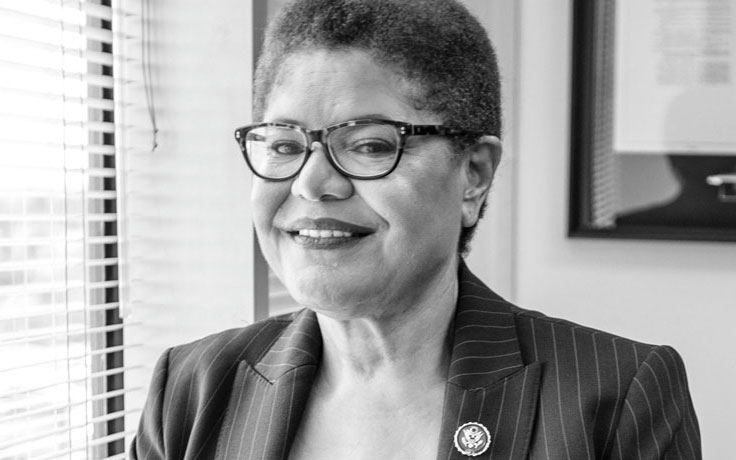KAREN BASS WAS TROUBLED.
“What if this is a high-risk pregnancy? And the woman needs to be hospitalized?” She pitched her questions, hard and fast, to three women staffers sitting around a coffee table in a conference room at the Rayburn House Office Building. “How do we make sure she’ll be treated by an ob-gyn?”
The six-term congresswoman from deep-blue West Los Angeles was worried about the medical care pregnant women receive in federal prisons. She flipped through an outline her staff had prepared for legislation she planned to introduce in response to reports of women giving birth shackled to beds or alone in their cells, or who suffered miscarriages for lack of prenatal care.
Bass, in a cornflower blue pantsuit and dark sandals, sat on a black leather couch near the coffee table in the tiny, windowless room. She shifted her feet gingerly. She had broken a toe. It was healing, she said, but she moved carefully. Her staff pulled three blue-and-gold chairs up to the sofa. The door opened every few minutes as other assistants entered to remind Bass of upcoming appointments, or deliver messages, and then silently left.
Her mind was on pregnant women inmates, but she kept an eye on a closed-circuit television on the wall streaming debate in the House Judiciary Committee down the hall, where she had argued passionately 40 minutes earlier for subpoenaing 12 people, including President Trump’s son-in-law Jared Kushner and former attorney general Jeff Sessions. Subpoenas were necessary, she said, “to get all the facts about the family separation policy” for migrants.
Trump’s policy, Bass said, meets the legal definition of child abuse “in every state in this country.”
When Jerrold Nadler, the Judiciary chairman, finally called for a vote, Bass stood up and hobbled on her injured toe back to the committee room and added another “aye” to the Democratic majority.
She returned to her staff in the small conference room with the black leather couch. Bass moved quickly through their outline of her proposed pregnant-inmate legislation, crossing out provisions that were vague or politically problematic.
There was a bit of levity. Should the bill set treatment standards for a common but painful consequence of breastfeeding?
A male member of her staff had joined the discussion. He blushed.
Bass ribbed him gently.
She wanted to do two things: Combine her long-standing concerns for criminal justice and women’s health, and draw in Republican colleagues. She viewed Republican women in the House as natural allies for this bill. She focused on what it would take to win their support.
One aide asked: Should the bill use the term “embryo” or “fetus”?
“I don’t want to go down that road,” Bass said abruptly. She insisted that the legislation adopt the more generic “pregnant women” to avoid raising the issue of abortion. “Otherwise we’ll lose the Republican women.”
Because she hoped the bill would win allies for future legislation improving conditions for all female inmates, Bass needed a way to collect more and better data on women in U.S. prisons.
How to pay for that?
“Maybe through a grant program, preferably without taking money from an agency that will oppose us,” she suggested, cracking a smile.
She leaned back on the sofa as the room cleared. “This is how the political sausage gets made.”
Indeed, Bass is known as one of the best sausage makers in Congress.
Growing up in L.A.
Karen Bass, 66, grew up in an African American family in the Venice-Fairfax district of West Los Angeles. She is one of four children. Her father was a mail carrier, and her mother owned a beauty salon before she decided to stay at home to raise her family.
Bass attended Cal State Dominguez Hills, earned an undergraduate degree, then trained and worked as a physician’s assistant. In response to the crack cocaine explosion in the 1990s, she switched careers. She founded the nonprofit Community Coalition in South L.A. Bass served as its executive director for 14 years. She brought together African American and Latino residents to block rebuilding a number of neighborhood liquor stores following the 1992 riots.
The coalition also worked to improve local schools and increase access to health care. Several of the youngsters who hung around the coalition offices were in the county dependency system, and they left her with an abiding interest in foster children.
Her years with the coalition also defined her personal style.
“Karen doesn’t fly into a room and yell, ‘I’m here!’ ” said Karen Earl, a friend since the 1990s. She is passionate about causes dear to her, but she likes to operate quietly, sometimes behind the scenes.
In 2004, her career took another turn when she decided to run for public office. Bass won a seat in the California Assembly. In four years, she rose to speaker and became the first African American woman to lead the lower house of any legislature in America.
Her timing was miserable.
Bass believes deeply that government can improve lives. But California was facing its worst fiscal crisis in decades.
Now making sausage meant finding ways to slash $40 billion from the state budget.
Some of the money had to come from education.
The legislature voted deep cuts in funding for the University of California and Cal State systems.
Shortly afterward, Bass visited UCLA.
The anger on campus left a deep impression.
When she tried to leave, student protesters ran toward her car. She felt it begin to rock. Then harder. The students were not going to let her go.
She sat in the car and called her office. “Well, you know,” she remembers saying, “I’m going to be a little late.”
She climbed out of the car and offered to sit with protesters.
By now, Karen Earl said, Bass had learned that she could “use her office to impact her community in mighty and fantastic ways that had nothing to do with legislation.”
The students gathered around her.
Calmly, she laid out the choices that the legislature had been forced to make.
“Do you think I should have cut health care to children?” she said. “Or cut foster care?”
Oh, no, they insisted.
“Well, that is what we faced.”
She saw how much the students wanted to be heard on an issue that affected them directly. She offered to return with Assembly colleagues. In the meantime, she urged the protesters to keep fighting “because when the economy gets better you have to make sure you’re not forgotten.”
It was vintage Bass, said Raphael Sonenshein, who directs the Pat Brown Institute for Public Affairs at Cal State L.A. “She embodies the essence of political and legislative leadership: Pick a fight when you have to, but don’t pick it just to prove you can. And provide ways that people can join what you’re trying to accomplish.”
Before the budget struggle was through, Bass suffered a deep personal loss. Her only child, Emilia, and son-in-law were killed in a car accident on the 405 freeway. Hector De La Torre, a good friend and colleague in the Assembly, said, “It really threw her.”
It took her a while to regain her footing, De La Torre said.
Bass, who is divorced from Emilia’s father, was surrounded by stepchildren, who remain close to her.
From Sacramento to Washington
In 2010, Bass was nearing her term limit in the Assembly. When Diane Watson decided to retire from Congress, Bass ran for Watson’s seat. She would credit the Assembly with “coloring everything I do” and forcing her to view Congress as larger than a place to pursue the priorities of only her progressive allies.
She had no primary opponent and trounced her Republican rival with 86 percent of the vote.
Bass moved quickly into leadership roles. During her first term, she helped found the bipartisan Congressional Caucus on Foster Youth, which she still co-chairs. Last year, she was elected head of the Congressional Black Caucus. This January, she headed the Foreign Affairs subcommittee on Africa and human rights.
She is known as a fierce liberal with street credibility from her years at the Community Coalition. Partial to knit suits in bold reds and blues, which women her age are sometimes gently advised to avoid, she works across the aisle to pass legislation, while calming the fractious Democratic caucus. Bass is so good at it, she is mentioned increasingly as a possible successor to Speaker Nancy Pelosi.
Striding briskly through the Rayburn Building on a day of back-to-back meetings, she brings to mind Lewis Carroll’s scurrying White Rabbit. But in pursuit of her legislative goals, Bass is slow, personal, almost stealthy, deploying genuine humility and the ability to meet people where they are.
“Karen has very deeply held beliefs, but she’s not dogmatic,” said De La Torre, her friend in the Assembly.
“I’m going after your heart, not so much your mind,” Bass told me. “I’m not gonna sit there and fill you up with facts. I’m gonna try to grab you emotionally.”
To wit, Omaha Republican Don Bacon, a Trump supporter with a 93 percent rating from the National Rifle Association and zero percent from Planned Parenthood. Bacon and Bass co-chair the foster youth caucus, which sponsors an annual Shadow Day pairing of 100 foster teenagers from across the country with their members of Congress to advocate changes in the child welfare system and learn how policy is made.
“I attended Shadow Day,” Bacon said, “and expressed interest in a couple of bills with Karen, and she reached out to me.” Bacon and his wife had fostered, then adopted two children, now in their 20s. Bass saw an ally.
He said she told him: “You have to make your time here count.”
Bacon said some committee chairs dominate, but Bass “makes sure everyone has a voice and can talk about their priorities. Even when we disagree.”
Her efforts with GOP colleagues, like Bacon, ultimately won Trump’s signature on the Family First Prevention Services Act last year, a landmark bill the foster youth caucus sponsored that allows funds to be used for services on behalf of children before they fall into foster care, not just afterward.
The caucus is now pushing a bill to better protect children from sex trafficking.
The future of the party
Bass flies home to her district almost every weekend. On one visit, she invited Ohio Republican Steve Chabot to join her in Los Angeles. Chabot was unhappy with her growing calls to change the criminal justice system, which experts say disproportionately punishes people of color.
Her long game is building relationships one Republican at a time. During a hearing on gang violence, she said, she heard Chabot “saying all kinds of crazy things” about sentencing reform.
She approached him privately. “Steve, you don’t know what you’re talking about,” she recounted telling him. “I know you’re a man of faith. I know you believe in redemption, but I’m sure you’ve never met a gang member in your life.”
She took Chabot to Homeboy Industries, run by Gregory Boyle, a Jesuit priest. It is one of the most effective gang intervention programs in the nation. Chabot sat in a circle of men. Each expressed remorse for the violent felonies that had landed them in prison. They described how they were changing their lives.
She thinks the visit changed Chabot’s views.
Neither Chabot nor his staff responded to multiple email and telephone requests for comment.
On another trip to L.A., Bass hosted a town hall at a family services center in Cheviot Hills. After a brief PowerPoint recap of the first 100 days of the new Congress, she took questions. Each time she mentioned the Affordable Care Act, a man wearing a MAGA hat silently raised a hand-lettered placard that said, “LIES!” She ignored him.
Minutes later, another man, who had waited his turn to talk, railed against undocumented immigrants. He unfurled a large Trump banner.
Members of the audience jeered.
Bass shushed them.
Calmly, she asked the man to roll up the banner.
“It’s important,” she told me afterward, “for the crowd to see that we can be respectful but let them say their piece. We totally disempower them by just letting them talk. What they want me to do is to get angry and stop them from speaking.”
Speaker?
Is she interested in Pelosi’s job?
That would not be unrealistic, said Fabian Nuñez, who preceded Bass as speaker of the California Assembly. “Pelosi immediately took a liking to Karen. I wouldn’t be surprised if Pelosi is courting Karen to succeed her.”
Bass, he pointed out, made her bones as speaker in the legislature of the largest state in the Union.
Sonenshein agrees. “She is formidable in a very different way from Pelosi, but in a way that probably fits the party in the future.”
With a slow smile, Bass conceded that she is “interested in House leadership, but I’m not focused on any one particular position.
“We have a speaker right now whom I support very, very much.”
In a statement issued by her office, Pelosi praised Bass’ leadership of the Congressional Black Caucus and gave her high marks “as an energetic, effective coalition builder, who powerfully weaves together diverse, dynamic alliances.” Noting that she and Bass are “first woman speakers” — Bass of the California Assembly, and Pelosi of the House of Representatives — Pelosi added: “We share a special connection that I prize.”
But the overriding priority, Bass said, is Trump. “During the eight years of Obama, I think we became complacent,” she said. “We got punched in the face with Trump. My hope is that we have learned that we always have to be involved.”

























